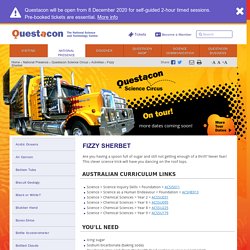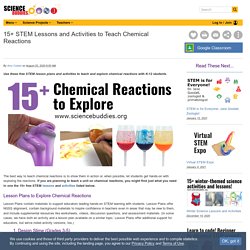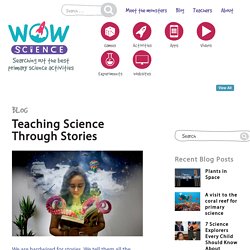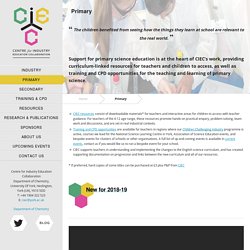

Questacon - The National Science and Technology Centre. Are you having a spoon full of sugar and still not getting enough of a thrill?

Never fear! This clever science trick will have you dancing on the roof tops. Australian Curriculum links Science > Science Inquiry Skills > Foundation > ACSIS011 Science > Science as a Human Endeavour > Foundation > ACSHE013 Science > Chemical Sciences > Year 2 > ACSSU031 Science > Chemical Sciences > Year 6 > ACSSU095 Science > Chemical Sciences > Year 8 > ACSSU225 Science > Chemical Sciences > Year 9 > ACSSU179 You'll need Icing sugar Sodium bicarbonate (baking soda) Powdered citric acid (from the health food section in your supermarket) Plastic cup or patty pans Teaspoon Tablespoon Try this Add one tablespoon of icing sugar, one teaspoon of bicarbonate of soda and one teaspoon of citric acid to the plastic cup.
Further investigation Try adding different amounts of each ingredient to see if you can make the mixture more or less fizzy. What's happening? Real world links. SAPS Primary Resources Homepage. Time for Slime. 15+ STEM Lessons and Activities to Teach Chemical Reactions. By Amy Cowen on August 20, 2020 8:00 AM Use these free STEM lesson plans and activities to teach and explore chemical reactions with K-12 students.

The best way to teach chemical reactions is to show them in action or, when possible, let students get hands-on with exploring the reactions. If you are planning to teach a unit on chemical reactions, you might find just what you need in one the 15+ free STEM lessons and activities listed below. Lesson Plans contain materials to support educators leading hands-on STEM learning with students. WowScience - Science games and activities for kids. Psychologists recognise that the story format gets a different kind of attention in our brain – it is ‘psychologically privileged’.

Our minds tend to look for cause and effect and even if the information is not presented as cause and effect, we tend to remember things in this way, in this order. Other important factors that our brains listen out for are conflict and characters and complications: we wonder with whom should we empathise in the story and how do they cope with difficult events? So, how can we use this in the classroom? Stories about scientists History is an obvious candidate for teaching through stories as the content is largely cause and effect and there is often an emotional content to a historical story too, which engages the reader/listener.
One way to use stories is to tell the story of the scientist. Mary Anning is the classic example. It is not the science in the story of Mary Anning story that grips us. A gripping read. But the stories don’t move me. Northern Lights. Clouds - Science Activities. Make a Convection Heat Powered Windmill - Fun Kids Science Experiments. Adventures in Chemistry Hands-on Experiments. Make a ghost glove. Make a 'ghost glove' by mixing and splitting carbonic acid!

This crazy experiment adapted from the Nat Geo Kids book Try This! Is guaranteed to get you excited about chemical reactions. This is a multistep reaction. Vinegar is acetic acid, and baking soda contains sodium bicarbonate, a base. They don’t just mingle when mixed—their molecules rearrange into something else. Primary science resource packages. STEM-Works - Middle Sea Activities - How Salty is the Sea? Floating and Sinking.
Links to videos and articles related to the topic you want to investigate. Use the topic explorer symbol to see which topics are covered. – louisewatson
Primary. CIEC resources consist of downloadable materials* for teachers and interactive areas for children to access with teacher guidance.

For teachers of the 4-12 age range, these resources promote hands-on practical enquiry, problem-solving, team work and discussions, and are set in real industrial contexts. Training and CPD opportunities are available for teachers in regions where our Children Challenging Industry programme is active, courses we lead for the National Science Learning Centre in York, Association of Science Education events, and bespoke events for clusters of schools or other organisations. A full list of up and coming events is available in current events, contact us if you would like us to run a bespoke event for your school. CIEC supports teachers in understanding and implementing the changes to the English science curriculum, and has created supporting documentation on progression and links between the new curriculum and all of our resources.
Resources Archive - Learning.